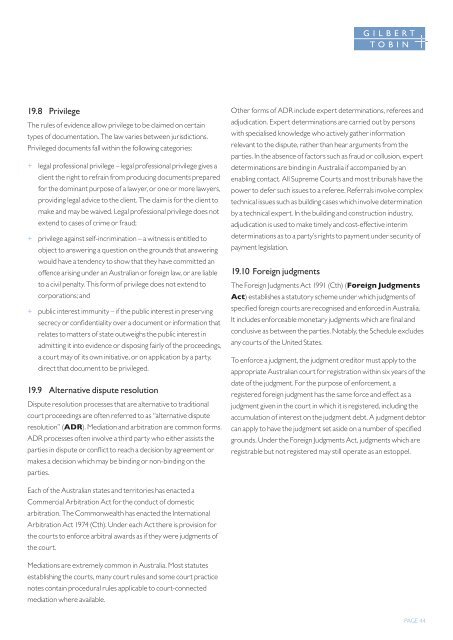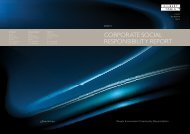Gilbert + tobin
Gilbert + tobin
Gilbert + tobin
- No tags were found...
You also want an ePaper? Increase the reach of your titles
YUMPU automatically turns print PDFs into web optimized ePapers that Google loves.
19.8 PrivilegeThe rules of evidence allow privilege to be claimed on certaintypes of documentation. The law varies between jurisdictions.Privileged documents fall within the following categories:+ + legal professional privilege – legal professional privilege gives aclient the right to refrain from producing documents preparedfor the dominant purpose of a lawyer, or one or more lawyers,providing legal advice to the client. The claim is for the client tomake and may be waived. Legal professional privilege does notextend to cases of crime or fraud;+ + privilege against self-incrimination – a witness is entitled toobject to answering a question on the grounds that answeringwould have a tendency to show that they have committed anoffence arising under an Australian or foreign law, or are liableto a civil penalty. This form of privilege does not extend tocorporations; and+ + public interest immunity – if the public interest in preservingsecrecy or confidentiality over a document or information thatrelates to matters of state outweighs the public interest inadmitting it into evidence or disposing fairly of the proceedings,a court may of its own initiative, or on application by a party,direct that document to be privileged.19.9 Alternative dispute resolutionDispute resolution processes that are alternative to traditionalcourt proceedings are often referred to as “alternative disputeresolution” (ADR). Mediation and arbitration are common forms.ADR processes often involve a third party who either assists theparties in dispute or conflict to reach a decision by agreement ormakes a decision which may be binding or non-binding on theparties.Other forms of ADR include expert determinations, referees andadjudication. Expert determinations are carried out by personswith specialised knowledge who actively gather informationrelevant to the dispute, rather than hear arguments from theparties. In the absence of factors such as fraud or collusion, expertdeterminations are binding in Australia if accompanied by anenabling contact. All Supreme Courts and most tribunals have thepower to defer such issues to a referee. Referrals involve complextechnical issues such as building cases which involve determinationby a technical expert. In the building and construction industry,adjudication is used to make timely and cost-effective interimdeterminations as to a party’s rights to payment under security ofpayment legislation.19.10 Foreign judgmentsThe Foreign Judgments Act 1991 (Cth) (Foreign JudgmentsAct) establishes a statutory scheme under which judgments ofspecified foreign courts are recognised and enforced in Australia.It includes enforceable monetary judgments which are final andconclusive as between the parties. Notably, the Schedule excludesany courts of the United States.To enforce a judgment, the judgment creditor must apply to theappropriate Australian court for registration within six years of thedate of the judgment. For the purpose of enforcement, aregistered foreign judgment has the same force and effect as ajudgment given in the court in which it is registered, including theaccumulation of interest on the judgment debt. A judgment debtorcan apply to have the judgment set aside on a number of specifiedgrounds. Under the Foreign Judgments Act, judgments which areregistrable but not registered may still operate as an estoppel.Each of the Australian states and territories has enacted aCommercial Arbitration Act for the conduct of domesticarbitration. The Commonwealth has enacted the InternationalArbitration Act 1974 (Cth). Under each Act there is provision forthe courts to enforce arbitral awards as if they were judgments ofthe court.Mediations are extremely common in Australia. Most statutesestablishing the courts, many court rules and some court practicenotes contain procedural rules applicable to court-connectedmediation where available.PAGE 44







